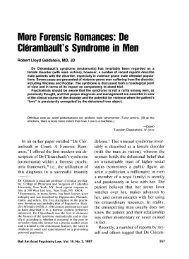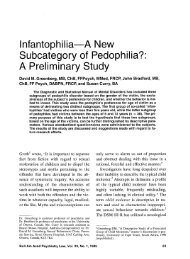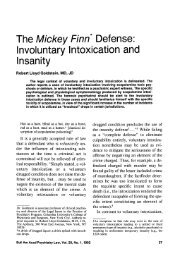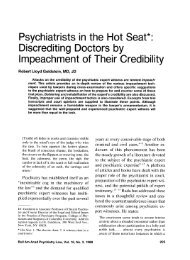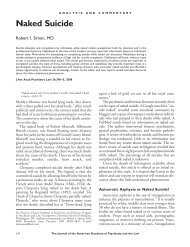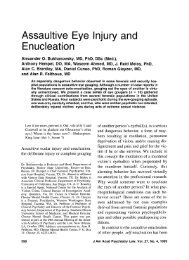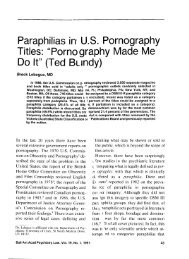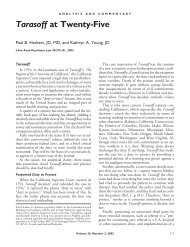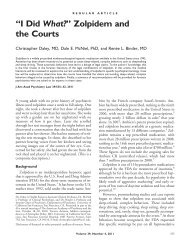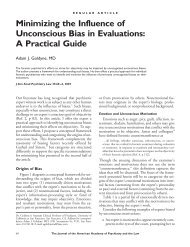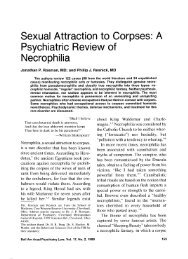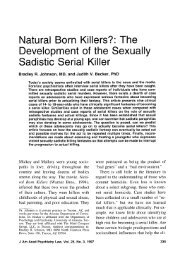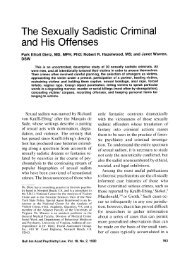Accommodations for Test Anxiety Under ADA?
Accommodations for Test Anxiety Under ADA?
Accommodations for Test Anxiety Under ADA?
Create successful ePaper yourself
Turn your PDF publications into a flip-book with our unique Google optimized e-Paper software.
<strong>Accommodations</strong> <strong>for</strong> <strong>Test</strong> <strong>Anxiety</strong> <strong>Under</strong> <strong>ADA</strong>?<br />
accommodated examinees do not, in fact,<br />
use much of the extra time.<br />
For some people, test anxiety is a<br />
chronic, life-long affliction. They manage<br />
to get through school by adopting various<br />
strategies. For example, they learn to select<br />
courses in which the grade is determined<br />
primarily by papers, homework,<br />
and classroom discussion. Or they become<br />
adept at convincing teachers to<br />
modify the testing situation <strong>for</strong> them.<br />
When these strategies fail, they must<br />
learn to cope with the disappointments of<br />
grades that do not accurately reflect their<br />
knowledge.<br />
For others, test anxiety may develop<br />
relatively late in their academic careers.<br />
A typical scenario may look like this: a<br />
successful student unexpectedly does<br />
poorly on an important exam. Memories<br />
of this failure cause the student to feel<br />
more nervous on the next exam, thereby<br />
further impairing per<strong>for</strong>mance. On the<br />
third exam, there are now two previous<br />
failures to evoke anxiety, and so on. A<br />
downward spiral of this sort can rapidly<br />
develop into serious test anxiety when the<br />
symptoms occur intensely and consistently<br />
to most testing situations.<br />
As Distinct from Normal Nervousness<br />
How does test anxiety differ from the<br />
nervousness all of us feel while taking an<br />
exam? Do we all have a psychiatric disorder?<br />
This kind of question arises with<br />
regard to many psychiatric diagnoses.<br />
Frequently, the critical symptoms identifying<br />
a psychiatric disorder include normal<br />
traits such as indecision, sadness, or<br />
worry. However, the traits do not reach<br />
the criterion of a mental disorder unless<br />
they are what is termed "clinically signif-<br />
icant."" Clinical significance is determined<br />
in two ways. One measure is the<br />
degree of impairment in functioning.<br />
Thus, if a student becomes anxious on an<br />
exam, but per<strong>for</strong>mance is not significantly<br />
below what would be expected<br />
based on the student's knowledge or skill,<br />
then the anxiety is not clinically significant<br />
on this dimension.<br />
The second measure is the degree of<br />
distress experienced. Thus, a student may<br />
become anxious during an exam, but the<br />
degree of distress may be well within the<br />
range experienced by most students in a<br />
testing situation and there<strong>for</strong>e not clinically<br />
significant. To assess the degree of<br />
distress, several psychological tests have<br />
been developed. Two of the most important<br />
are the Reactions to ~ests" and the<br />
<strong>Test</strong> Attitude Inventory.12 In both of these<br />
tests, students are presented with statements<br />
describing typical symptoms of test<br />
anxiety (e.g., "I freeze up when I think<br />
about an upcoming test"; "During tests I<br />
find myself thinking about the consequences<br />
of failing") and they must indicate<br />
whether the statement is true of them<br />
"almost always." "often," "sometimes,"<br />
or "almost never." Because these tests<br />
have been administered to large numbers<br />
of students, it is possible to know when a<br />
person's score is significantly above the<br />
average.<br />
Nondiscrimination on the Basis<br />
of Disability<br />
<strong>ADA</strong> The <strong>ADA</strong> is modeled after<br />
Section 504 of the Rehabilitation Act of<br />
1973, which prohibits discrimination<br />
against otherwise qualified persons with<br />
disabilities in any program receiving fed-<br />
J Am Acad Psychiatry Law, Vol. 25, No. 2, 1997 199




